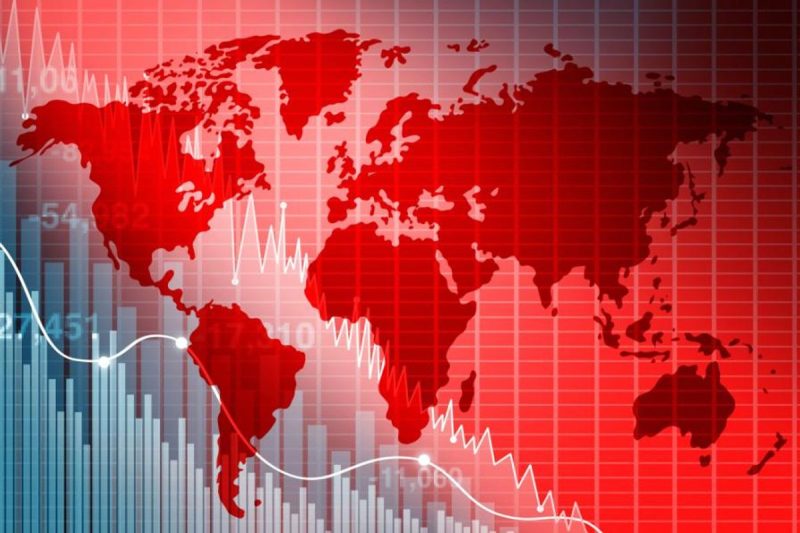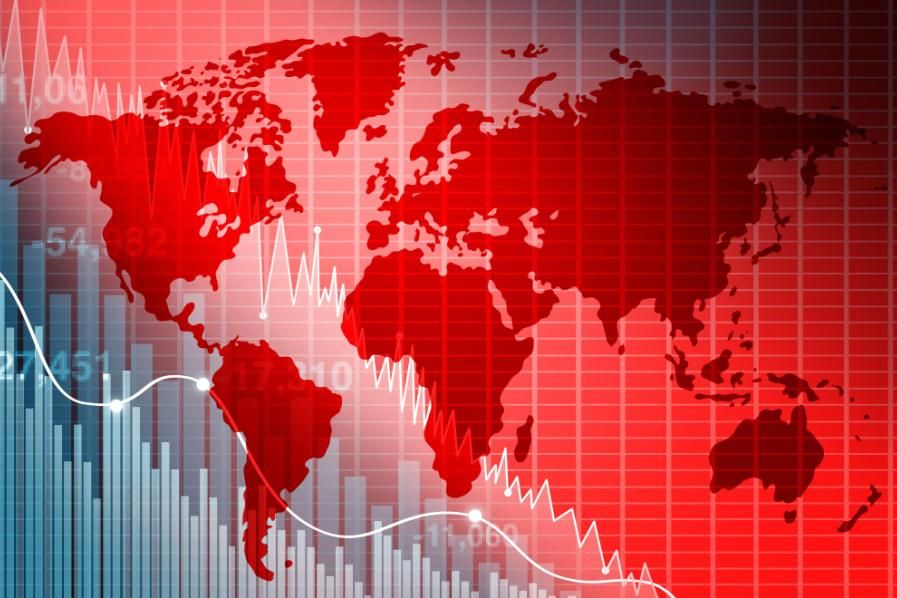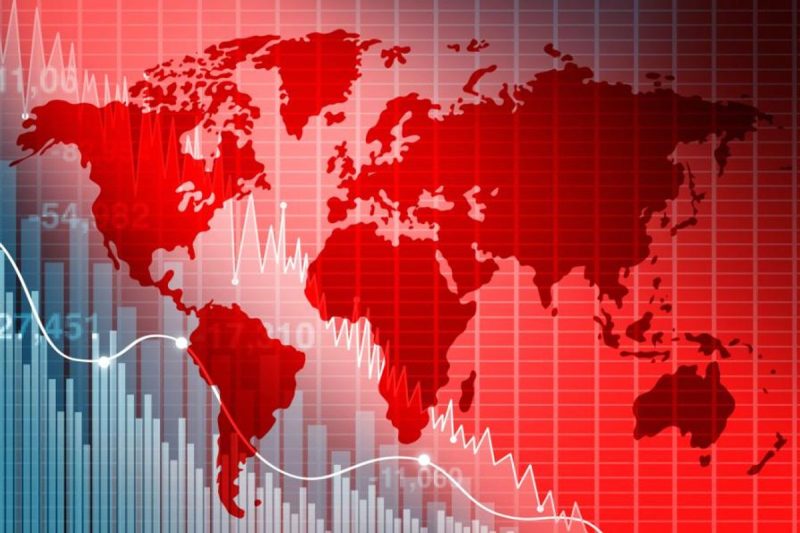

‘Never miss out on an opportunity like a recession’ — Jack Welch, former chairman and CEO of General Electric.
US President Donald Trump’s plans to overhaul the current global trade structure through sweeping tariffs have once again ignited recession fears. With both businesses and consumers considering pulling back on spending if costs rise, many economists are forecasting a higher risk of a deep economic downturn.
Goldman Sachs’ (NYSE:GS) seesaw recession predictions on April 9 are a clear indication that much remains unclear when it comes to the possible implications for the US economy. That day, the firm forecasted a GDP loss of 1 percent in 2025 and a 65 percent probability of a recession in the next 12 months.
However, within an hour, Trump announced a 90 day pause on his reciprocal tariffs and the group returned to its previous non-recession baseline forecast, with GDP growth of 0.5 percent and a 45 percent probability of recession.
Goldman Sachs isn’t alone in its reluctance to say a recession is in the cards. During an April 14 Fox Business interview, Bank of America (NYSE:BAC) CEO Brian Moynihan said his firm does not expect to see a recession in 2025, although he acknowledged that BoA did lower its GDP forecast for the year and that continued uncertainty around tariffs could change its outlook.
However, others believe the country has already entered a recession.
“I think we’re very close, if not in, a recession now,” Blackrock (NYSE:BLK) CEO Larry Fink told CNBC during an April 11 interview. “I think you’re going to see, across the board, just a slowdown until there’s more certainty. And we now have a 90-day pause on the reciprocal tariffs — that means longer, more elevated uncertainty.”
So — are we in a recession? Even though nailing down an answer is tricky, investors educate themselves on what a recession is, how long they last and what strategies may work well during these difficult economic periods.
In this article
What is a recession?
When a country’s economic activity experiences a serious and persistent decline over an extended period, often over two consecutive quarters, economists often call it a recession. Recessions involve a broad array of economic sectors, not just a decline among one or two industries.
Some of the key indicators of a recession include rising unemployment levels, negative GDP, stock market selloffs and falling manufacturing data, as well as declining consumer confidence as evidenced by dropping retail sales.
Answering the question of whether we’re in a recession is difficult because so many factors are at play — while one expert might weigh GDP declines heavily in their analysis, another might feel other elements are more important.
Watch the video from mid-2023 below to get a sense of why getting a consensus on whether we’re in a recession can be tough.
Experts Rick Rule, Adrian Day and Mike Larson explain why it’s hard to get an answer on whether the US is in a recession.
What causes a recession?
Forbes lists a number of catalysts that can spark a recession: sudden economic shock, excessive debt (think the US mortgage debt crisis that fueled the Great Recession in 2008), asset bubbles, uncontrolled inflation (which leads central banks to raise interest rates, making it more expensive to do business or pay down debts), runaway deflation and technological changes. Tariffs have also historically been linked with recession.
How can tariffs cause a recession?
Tariffs can cause a recession through a domino effect of increased costs, supply chain disruptions, inflationary pressures and investment uncertainty — all of which can bring about massive layoffs in critical sectors of the economy.
Economic historians, such as Dr. Phillip Magness of the Independent Institute, have pointed to the worsening of the Great Depression following the passing of the Smoot-Hawley Tariff Act of 1930 as offering a potent warning about the potential outcome of the sweeping tariffs being enacted under US President Trump.
Watch the video below to learn more about the potential for tariffs to spark a recession and why investors are looking to gold for safety.
Magness said there’s still a chance to avoid a recession if Trump reverses course on his tariff policy.
Are there signs before a recession?
What are the telltale signs that warn of a recession in advance? Much like accurately forecasting the weather, making any sort of economic forecast is difficult. But there are certain signals economists look out for.
Aside from the previously mentioned slumping GDP and falling copper prices, one of the most prominent harbingers of a looming recession is an inverted bond yield curve.
“The bond market can help predict the direction of the economy and can be useful in crafting your investment strategy,” Investopedia states. “This metric — while not a guarantee of future economic behavior — has a strong track record.”
In addition, declining unemployment figures, shrinking industrial output, falling retail sales and dramatic stock market selloffs are often considered classic indicators of a potential recession.
Will there be a recession in 2025?
Forecasting recessions can be tricky. There are extenuating circumstances that may allow for a reversal of fortunes before a deeper recession takes hold, but in the meantime many historical recession signals are currently flashing red.
Newsweek has cited a number of US economists who identified five critical recession indicators on display, including declining consumer confidence, increasing credit card late payments and defaults, higher business and trade policy uncertainty, and rising inflation expectations.
‘The layoff cycle is indeed accelerating into 2025,’ she said. ‘The biggest determination of prices (for goods and services) that can or cannot be paid is what your paycheck is. What we’re seeing is average weekly earnings have stagnated starting in December, and have begun to fall on an inflation adjusted basis.’
DiMartino Booth sees the central bank potentially cutting rates four to five times in 2025.
Is Warren Buffett predicting a recession?
Warren Buffett is not known for his direct forecasts. In fact, he’s likely to say, “Nothing is sure tomorrow, nothing is sure next year and nothing is ever sure, either in markets or in business forecasts, or in anything else.” For that reason, his investment decisions are often read like tea leaves by market watchers looking for signs on where to invest.
So when the Oracle of Omaha called tariffs ‘an act of war to some degree’ during a March 2025 CBS interview, it was not a good sign. Market watchers will certainly be on the lookout for new clues when Buffet speaks to shareholders at Berkshire Hathaway’s (NYSE:BRK.A,NYSE:BRK.B) annual meeting in May.
Another move by Buffett that’s being interpreted as a recession signal? Berkshire Hathaway’s decision to sell off of US$134 billion in equity positions in 2024 in order to beef up its cash holdings, which came in at a record US334 billion as of March 2025.
How long do recessions last?
Recessions are considered a part of the normal expansions and contractions of the business cycle.
While not as catastrophic as depressions, recessions can last for several months and even years, with significant consequences for governments, companies, workers and investors. Each of the four global recessions since World War II lasted about one year.
That said, there have been a few short-lived recessions in the US, including the 2020 pandemic recession. Stock markets around the world crashed at the onset of the COVID-19 outbreak. A record 20.5 million jobs were lost in the US alone in April 2020 as the nation’s unemployment rate reached 14.7 percent.
The Fed responded by cutting interest rates, and the US federal government issued trillions of dollars in financial aid to laid-off workers and impacted businesses. By October 2020, US GDP was up 33.1 percent, marking an end to the recession.
What sectors are hardest hit by a recession?
Businesses often tighten their belts during recessions by postponing expansion plans, reducing worker hours and benefits or laying off employees. Those same workers are the consumers who play a vital role in the strength of a nation’s economic activity.
With less disposable income, consumers stop spending on large appliances, vehicles, new homes, evenings out and vacations. The focus shifts to low-priced necessities, food and medical needs. Declining consumer spending and demand for goods and services pushes the economy into a deeper recession, resulting in more layoffs and rising unemployment. Small- and medium-sized business owners may even find themselves unable to operate entirely.
Typically, retail, manufacturing, restaurants, technology, travel and entertainment are hit the hardest during a recession. The real estate and mortgage lending sectors may also feel the pain.
As the recession worsens, some homeowners may not be able to pay their mortgages and could face defaults, which can bring further downward pressure on real estate prices. Those still shopping for a home or new car may find that banks have instituted much tighter lending policies on mortgages and car loans.
Meanwhile, investors can lose money as their stock holdings and real estate assets lose their value. Retirement savings accounts linked to the stock market can also suffer.
All of these forces can contribute to a deflationary environment that leads central banks to cut interest rates in an effort to stimulate the economy out of a recession.
How to prepare for a recession?
There is no perfect answer for how to invest during a recession, and no stock remains recession-proof. But for those who know how to practice due diligence through fundamental analysis, recessions do offer an opportunity to pick quality stocks at a discount.
“The stock market is the only store where when things go on sale, everyone runs out the door. You don’t want to be one of those people,” said Shawn Cruz, head trading strategist at TD Ameritrade. “So if you have a long term focus and some specific names you’re looking at, this is a good time to pick up some quality shares for your portfolio.”
It’s better to look at well-established publicly traded companies with strong balance sheets and minimal debt that still have the ability to generate cash and pay dividends. Companies to avoid include those with high debt loads and little cashflow, as they have a difficult time managing operating costs and debt payments during recessions.
Danielle DiMartino Booth advises investors to watch the data closely if they want to stay ahead of the curve, particularly payroll levels, layoff announcements, bankruptcies and store closures.
Industry matters, too. As mentioned, real estate, retail, manufacturing, restaurants, technology, travel and entertainment are hit the hardest during a recession. On the other hand, stocks in the consumer staples (food and beverage, household goods, alcohol and tobacco) and healthcare (biotech and pharmaceutical) sectors tend to do well in recessionary environments.
Inventors can further mitigate the risks that a recession brings by building a diversified portfolio that considers stocks across varying sectors and geographic regions. Rather than investing in individual stocks, exchange-traded funds with low management fees are another way to spread risk. The Vanguard Consumer Staples ETF (ARCA:VDC) and the Consumer Staples Select Sector SPDR Fund (ARCA:XLP) are two examples to consider.
Should I wait to invest until after a recession?
This question brings us back to the quote from General Electric’s Welch that’s cited at the beginning of this article. For long-term investors who understand the popular adage, “buy low, sell high,” a recession and its impact on share prices offers up those ‘buy low’ opportunities. That’s because all things come to an end, even recessions, and when that happens those who bought the dip will be well positioned to benefit from the rebound.
That said, due diligence never goes out of style. Not all companies will make it through a market downturn unscathed. To truly see returns from this investment strategy it’s critical to look for companies with strong balance sheets, experienced management and a history of performing well in bear markets. Opting for revenue-generating and dividend-paying stocks over growth stocks during a recession is another smart play.
Overall, experts advise that it’s not necessary to avoid investing during a recession.
“While (recessions) can be challenging for returns and growing wealth, we also see countercyclical rallies and the market is always forward-looking, so the keys are to remain fully invested, not be whipsawed by short-term market gyrations and to keep (focused) on your long-term goals,” Rajesh Nakadi, head of investments of the Global Family Office at BNY Mellon Wealth Management, told Forbes.
Danielle DiMartino Booth advises investors to focus on companies’ ability to maintain dividends and cash flow during this period, meaning defensive plays that pay dividends and are able to increase their payrolls are a worth a look.
What assets can hold their value in a deep recession?
For long-term investors looking to ride out the worst recessions, stocks and high-yield bonds are best avoided. Safer assets that have historically performed well during recessions include government bonds, managed futures, gold and cash.
It should be noted that while 10 year US Treasury bonds have an excellent reputation as a reliable safe haven asset, nothing is without risk. In early April 2025, following another round of tariffs announced by Trump, an unprecedented number of sellers, including foreign governments, ditched their US bond holdings, resulting in rising bond yields. Although yields fell a few days later, uncertainty in the bond market remains.
“There is clearly still a lot of concern over this highly unusual rise in Treasury yields at a time of equity market weakness and global concern over recession,” said Douglas Porter, chief economist at Bank of Montreal. “Notably, the backup in yields was mostly driven by rising real yields and not higher inflation premiums … indicating a more fundamental drop in demand.”
If you’ve parked your dollars in actual dollars, i.e. cash, instead of the stock market or bonds, the value is not being erased by declining stock prices. The ‘cash is king’ mantra speaks to the importance of keeping liquid assets on hand during a recession.
Along that same vein, gold has earned its safe-haven status because it is a physical asset that holds its value and can be easily liquidated.
One last thought — don’t move all your wealth into gold or cash. A diversified portfolio is still the best hedge against a recession.
Which stocks do well after a recession?
Once the economy is in the recovery stage and consumer confidence begins to improve, the best performing stocks in the market tend to be tied to the technology, financial, consumer discretionary, industrial, material and energy sectors.
The consumer discretionary (i.e. cars and appliances), material and industrial segments “are known as cyclicals, because they are closely tied to the fortunes of the economy,” the Royal Bank of Canada (TSX:RY,NYSE:RY) states. The bank explains that once demand improves, manufacturers will begin using up their inventory and will in turn “need to order metal, chemicals and other materials to create more goods to sell.”
Securities Disclosure: I, Melissa Pistilli, hold no direct investment interest in any company mentioned in this article.

